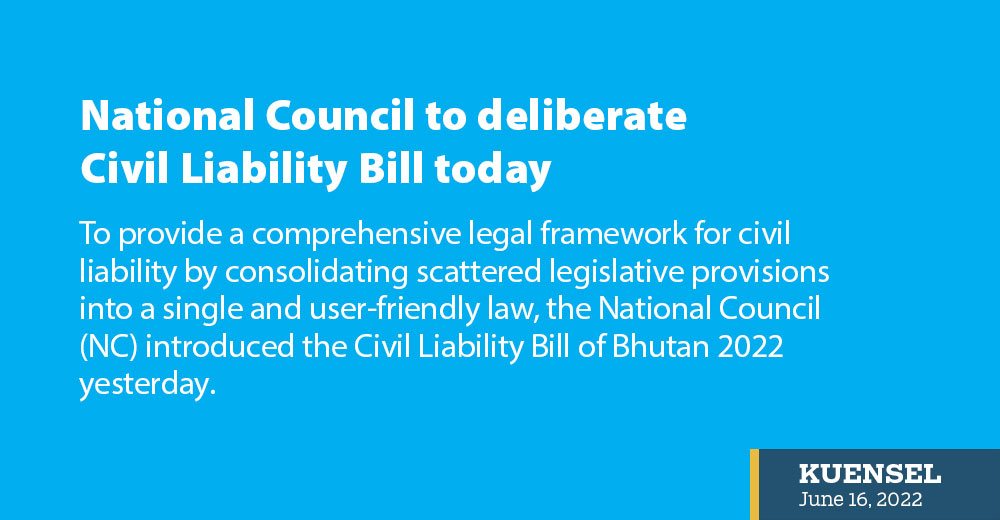Thinley Namgay
To provide a comprehensive legal framework for civil liability by consolidating scattered legislative provisions into a single and user-friendly law, the National Council (NC) introduced the Civil Liability Bill of Bhutan 2022 yesterday.
The members will deliberate on the 10 chapters of the Bill today.
The Bill is also expected to enhance accountability and transparency in society and build confidence in the legal system.
The Legislative Committee of NC framed the Bill with the support of relevant officials.
To make the bill more comprehensive, the Chairperson of the Legislative Committee and Tsirang MP Dhan Kumar Sunwar said that the committee reviewed the best practices of civil liability in developed countries such as the United States, the United Kingdom, Australia and Singapore, among others.
He said the committee looked into 26 relevant in-country laws and consulted agencies, officials from a few dzongkhags and gewogs.
So far, incidences of deaths, bodily injuries and property damage as a result of the negligence of individuals and authorities are rising.
For instance, a woman died last year after hitting by an electric pole in Changjiji, Thimphu and the National Housing Development Corporation Limited is responsible for missing timely maintenance of poles. However, this case is still ongoing in the Thimphu Dzongkhag Court.
Currently, the provisions governing civil liability are scattered across several existing legislations such as the Road Safety and Transport Act, the Labour and Employment Act, and the Civil and Criminal Procedure Code, among others.
Some existing legislation such as the Consumer Protection Act and the Bhutan Health and Medical Council Act does not contain any provisions on civil liability. None of these legislations provides adequate guidance on the method of calculating compensation.
Given this predicament, the victims face difficulty finding appropriate laws to file their compensation claims.
The Civil Liability Bill of Bhutan 2022 is expected to provide adequate guidance on the method of calculating the amount of compensation and has become critical to enforce its provisions on the fundamental right to property, including personal liberty and freedom.
Legislative Committee‘s Deputy Chairperson, Eminent Member Ugyen Tshering said the bill was framed based on the social, economic and political development of the country. “For instance, if we stare at a person for 15 seconds, it is a breach of civil liability in some countries. We didn’t include such a law.”
He said the Bill was more practical and would benefit the victims, especially the poor people who are unable to get justice and compensation despite their rights.
He said that the compensation was calculated based on the country’s situation and it will be less compared to developed countries.
NC members said that the Bill needs proper deliberation as its provisions are drawn mostly from other developed countries and that they need to be in the Bhutanese context.
They said that the usage of terms in the Bill is technical and it would be difficult for most people to understand.


